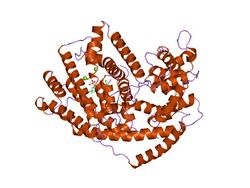Biology:Terpene synthase C terminal domain
| Terpene_synth_C | |||||||||
|---|---|---|---|---|---|---|---|---|---|
 5-epi-aristolochene synthase from nicotiana tabacum | |||||||||
| Identifiers | |||||||||
| Symbol | Terpene_synth_C | ||||||||
| Pfam | PF03936 | ||||||||
| InterPro | IPR005630 | ||||||||
| SCOP2 | 5eau / SCOPe / SUPFAM | ||||||||
| |||||||||
In molecular biology, this protein domain belongs to the terpene synthase family (TPS). Its role is to synthesize terpenes, which are part of primary metabolism, such as sterols and carotene, and also part of the secondary metabolism. This entry will focus on the C terminal domain of the TPS protein.
Function
Terpenes synthases have a role in producing important molecules in metabolism, these molecules are part of a large group called terpenoids . In particular, the C terminal domain catalyzes the cyclization of geranyl diphosphate, orienting and stabilizing multiple reactive carbocation intermediates. Or in simpler terms, the C terminal aids the synthesis of new molecules.
Structure
It is thought to have at least two alpha helices.[1]
Conservation
Sequences containing this protein domain belong to the terpene synthase family. It has been suggested that this gene family be designated tps (for terpene synthase). Sequence comparisons reveal similarities between the monoterpene (C10) synthases, sesquiterpene (C15) synthases and the diterpene (C20) synthases. It has been split into six subgroups on the basis of phylogeny, called Tpsa-Tpsf .[2]
- Tpsa includes vetispiridiene synthase.[3]
- Tpsb includes (-)-limonene synthase.[4]
- Tpsc includes copalyl diphosphate synthase (kaurene synthase A).[5]
- Tpsd includes taxadiene synthase,[6] pinene synthase,[7] and myrcene synthase.[8]
- Tpse includes ent-kaurene synthase B.[9]
- Tpsf includes linalool synthase.[10] In the fungus Phaeosphaeria sp. (strain L487) the synthesis of ent-kaurene from geranylgeranyl dophosphate is promoted by a single bifunctional protein.[11]
See also
Terpene synthase N terminal domain
References
- ↑ "Structural basis for cyclic terpene biosynthesis by tobacco 5-epi-aristolochene synthase.". Science 277 (5333): 1815–20. 1997. doi:10.1126/science.277.5333.1815. PMID 9295271.
- ↑ "Monoterpene synthases from grand fir (Abies grandis). cDNA isolation, characterization, and functional expression of myrcene synthase, (-)-(4S)-limonene synthase, and (-)-(1S,5S)-pinene synthase". J. Biol. Chem. 272 (35): 21784–92. August 1997. doi:10.1074/jbc.272.35.21784. PMID 9268308.
- ↑ [1], 5-epi- aristolochene synthase, [2] and (+)-delta-cadinene synthase SWISSPROT
- ↑ Hyatt, D. C.; Youn, B.; Zhao, Y.; Santhamma, B.; Coates, R. M.; Croteau, R. B.; Kang, C. (2007). "4S-limonene synthase precursor - Mentha spicata (Spearmint)". Proceedings of the National Academy of Sciences of the United States of America (Uniprot.org) 104 (13): 5360–5. doi:10.1073/pnas.0700915104. PMID 17372193. PMC 1838495. https://www.uniprot.org/uniprot/Q40322. Retrieved 2012-08-02.
- ↑ Ait-Ali, T.; Swain, S. M.; Reid, J. B.; Sun, T.; Kamiya, Y. (1997). "Ent-copalyl diphosphate synthase, chloroplastic precursor - Pisum sativum (Garden pea)". The Plant Journal: For Cell and Molecular Biology (Uniprot.org) 11 (3): 443–54. doi:10.1046/j.1365-313X.1997.11030443.x. PMID 9107034. https://www.uniprot.org/uniprot/O04408. Retrieved 2012-08-02.
- ↑ Wildung, M. R.; Croteau, R. (1996). "Taxadiene synthase - Taxus brevifolia (Pacific yew)". The Journal of Biological Chemistry (Uniprot.org) 271 (16): 9201–4. doi:10.1074/jbc.271.16.9201. PMID 8621577. https://www.uniprot.org/uniprot/Q41594. Retrieved 2012-08-02.
- ↑ "Pinene synthase, chloroplastic precursor - Abies grandis (Grand fir)". Uniprot.org. https://www.uniprot.org/uniprot/O24475.
- ↑ "Myrcene synthase, chloroplastic precursor - Abies grandis (Grand fir)". Uniprot.org. https://www.uniprot.org/uniprot/O24474.
- ↑ Yamaguchi, S.; Saito, T.; Abe, H.; Yamane, H.; Murofushi, N.; Kamiya, Y. (1996). "Ent-kaur-16-ene synthase, chloroplastic precursor - Cucurbita maxima (Pumpkin)". The Plant Journal: For Cell and Molecular Biology (Uniprot.org) 10 (2): 203–13. doi:10.1046/j.1365-313X.1996.10020203.x. PMID 8771778. https://www.uniprot.org/uniprot/Q39548. Retrieved 2012-08-02.
- ↑ "Linalool synthase - Clarkia concinna (Red ribbons)". Uniprot.org. https://www.uniprot.org/uniprot/Q9ZPN5.
- ↑ "Ent-kaurene synthase from the fungus Phaeosphaeria sp. L487. cDNA isolation, characterization, and bacterial expression of a bifunctional diterpene cyclase in fungal gibberellin biosynthesis". J. Biol. Chem. 272 (35): 21706–12. August 1997. doi:10.1074/jbc.272.35.21706. PMID 9268298.
 |

